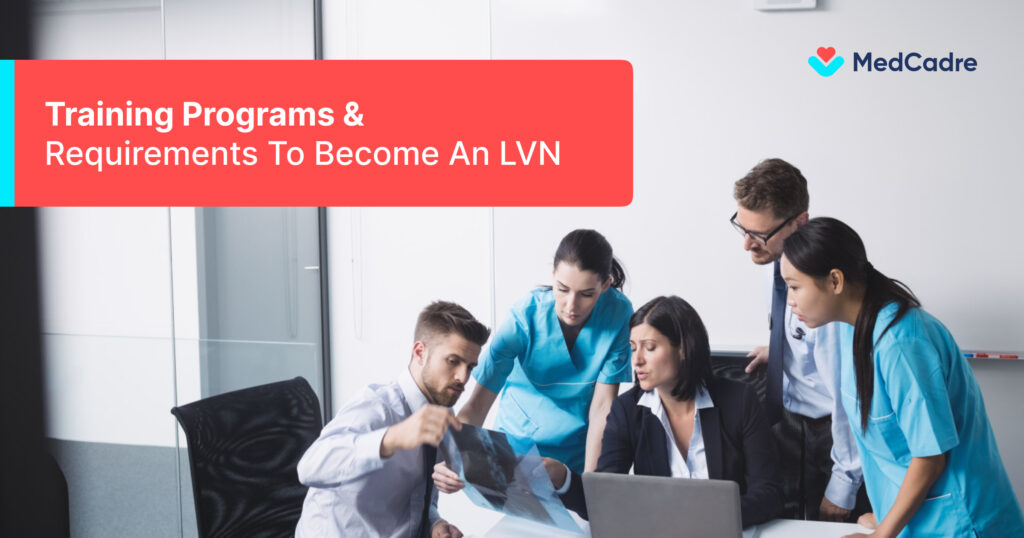Licensed vocational nurses (LVN), also known as licensed practical nurses (LPN) in some states of the USA, are an essential part of the healthcare industry. They provide direct patient care under the supervision of RNs and physicians. If you are interested in starting a career in healthcare and want to make a positive impact on people’s lives, becoming an LVN could be a rewarding choice. Today, we will learn about the training programs and requirements to become an LVN in the USA, and help you understand the complete process so that you can smoothly follow the steps to achieve your goals.
Training programs and requirements to become an LVN
The process of becoming an LVN can be broken down into smaller steps such as education, training, and meeting requirements. To gain a clear understanding, let’s tackle each step one by one.
Educational program requirements to become an LVN
Education is the one and the primary requirement to become an LVN in the USA, there are two primary pathways, and you can choose anyone the below:
Diploma programs
The diploma program is offered by community colleges, vocational schools, and some hospitals, these program takes 12-18 months to finish. It involves a mix of classroom theory and instructions and clinical rotations. They provide a comprehensive foundation in nursing fundamentals also. This course includes:
- Anatomy and physiology
- Pharmacology
- Medical-surgical nursing
- Maternal-newborn nursing
- Mental health nursing
- Geriatric nursing
- Communication and documentation
Associate’s Degree in Nursing (ADN)
ADN is also one of the most popular degree programs that offer a broad education in nursing. If you choose this degree, it usually requires a two-year program and covers additional subjects such as leadership and research. It also fulfills the educational requirement for taking the National Council Licensure Examination for Practical Nurses (NCLEX-PN). However, some diploma programs may qualify you for the NCLEX-PN exam as well.
Admission criteria for LVNs
Admission criteria or requirements are one of the major areas before taking admission to any program, they vary slightly across institutions but they typically include:
- High school diploma or GED
- Minimum GPA (usually 2.0-2.5)
- Passing entrance exams (some programs may require them)
- Completion of prerequisite courses (may include biology, chemistry, math, and english)
- Criminal background check and drug screening
- Proof of immunizations
What else is required to become an LVN
- Clinical rotations: All LVN programs require clinical hours where you gain hands-on experience under the supervision of licensed nurses in various healthcare settings like hospitals, clinics, and nursing homes. The required clinical hours vary by program but typically range from 200 to 700.
- NCLEX-PN exam: This national standardized exam assesses your knowledge and skills in providing nursing care. Passing the NCLEX-PN Exam is mandatory to become a licensed LVN in all states.
Some qualities and skills for success
While specific programs have selection processes, some qualities, and skills are highly valued in potential LVNs:
- Compassion and empathy: Providing emotional support and understanding to patients is essential.
- Strong communication and interpersonal skills: You must build rapport with patients, families, and other healthcare professionals.
- Critical thinking and problem-solving skills: Making sound judgments in fast-paced situations is crucial.
- Time management and organizational skills: Effective prioritization and organization are essential for managing patient care efficiently.
- Physical stamina and dexterity: The job may involve lifting, walking, and assisting patients with various needs.
Career opportunities for LVNs
LVNs can find diverse employment opportunities in various healthcare settings, including:
- Hospitals
- Long-term care facilities
- Clinics
- Doctors’ offices
- Home healthcare agencies
- Hospice care centers
With experience and additional qualifications, LVNs can pursue career advancement opportunities in specialized areas like geriatrics, pediatrics, or wound care.
What’s next?
After completing your education and training, and ensuring that you meet all the requirements, it’s time to apply for a job as an LVN. You can do this by reaching out to an LVN staffing agency such as MedCadre, where you’ll find over 500 job listings for LVNs. To apply for a job, follow these steps:
- Visit the MedCadre website
- Search for the job that matches your requirements
- Apply for the job through the “Apply Now” button
- You will receive an email or call from our recruitment team for further processing
Conclusion
Becoming an LVN is a rewarding career path that allows you to contribute directly to patient care and well-being. By diligently following the educational and licensing requirements to become an LVN, you can embark on a fulfilling journey in the healthcare field. Remember, to research different programs, consider your learning style and career aspirations, and don’t hesitate to reach out to institutions and healthcare professionals for guidance.


